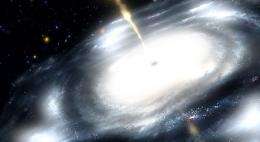May 31, 2013 report
Theorists apply loop quantum gravity theory to black hole

(Phys.org) —Physicists Rodolfo Gambini and Jorge Pullin of University of the Republic in Montevideo, Uruguay, and Louisiana State University respectively, have applied the theory of Loop Quantum Gravity (LQG) to a simplified black hole. In so doing, as they describe in their paper published in the journal Physical Review Letters, they suggest that instead of a singularity existing at its center, there is a portal to another universe.
For many years theoretical physicists have believed that the universe came about as a result of a single Big Bang event—Einstein's theories suggested it was so. The problem with this line of thinking however, is that the theory of general relativity can't describe what came before the singularity, which should exist at the point in time just before the Big Bang. Theory also suggests that a similar singularity should exist at the center of black holes, but again, general relativity fails to describe them properly. Worse, there is the problem of the information loss paradox—if something falls into a black hole and is eventually squeezed to a singularity, what happens to the information it contained? Big Bang physicists can't say.
To address these problems, Abhay Ashtekar and his team at Pennsylvania State University, back in 2006, came up with a theory known as loop quantum gravity. They suggested that instead of a singularity existing just before the Big Bang, there was the remains of a crunched down universe that had existed prior to the one that exists now. The universe didn't just Big Bang itself into existence from nothing, they said, instead there is an infinite loop where a universe shrinks down to a very tiny spot, then explodes in a Big Bang, then shrinks down again, over and over again forever—hence the use of the term "loop" in the theory. Since that time, some in the field have begun to refer to the theory as the Big Bounce, to replace the name Big Bang.
In this new effort Gambini and Pullin applied LQG to a simplified model of a black hole. Their experiment showed that everything that was pulled into the black hole didn't compress to a singularity after all—instead it was compressed to a certain small size, then was spit out in another part of the universe or into another universe entirely.
Because their model worked so well, the two suggest that it would likely work with real black holes as well. If this new theory is correct, they note, it would do away with the information loss paradox and open the door to the possibility of black holes being portals to other universes.
More information: Loop Quantization of the Schwarzschild Black Hole, Phys. Rev. Lett. 110, 211301 (2013) prl.aps.org/abstract/PRL/v110/i21/e211301
Abstract
We quantize spherically symmetric vacuum gravity without gauge fixing the diffeomorphism constraint. Through a rescaling, we make the algebra of Hamiltonian constraints Abelian, and therefore the constraint algebra is a true Lie algebra. This allows the completion of the Dirac quantization procedure using loop quantum gravity techniques. We can construct explicitly the exact solutions of the physical Hilbert space annihilated by all constraints. New observables living in the bulk appear at the quantum level (analogous to spin in quantum mechanics) that are not present at the classical level and are associated with the discrete nature of the spin network states of loop quantum gravity. The resulting quantum space-times resolve the singularity present in the classical theory inside black holes.
via Synopsis
Journal information: Physical Review Letters
© 2013 Phys.org

















